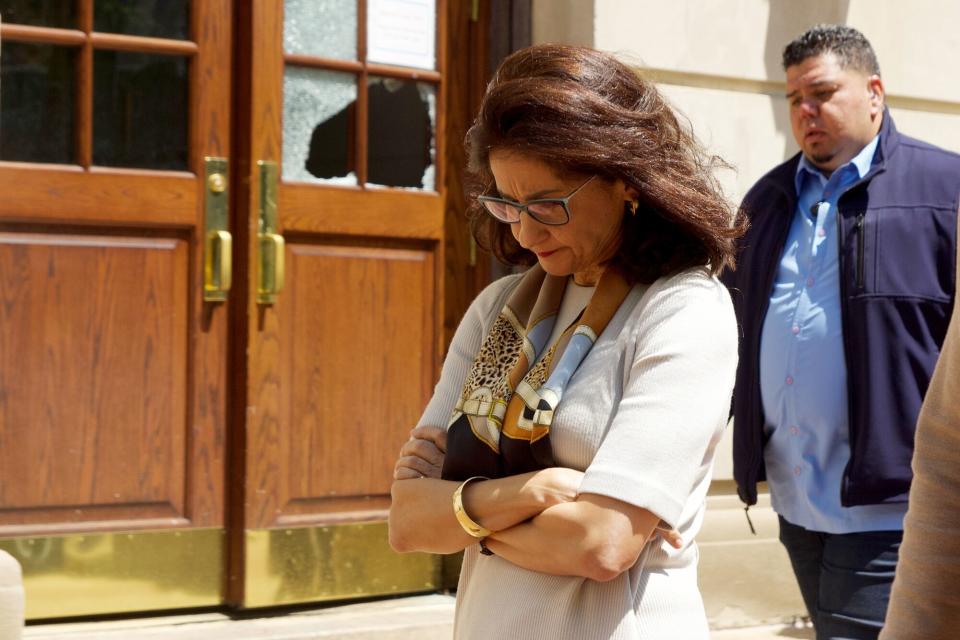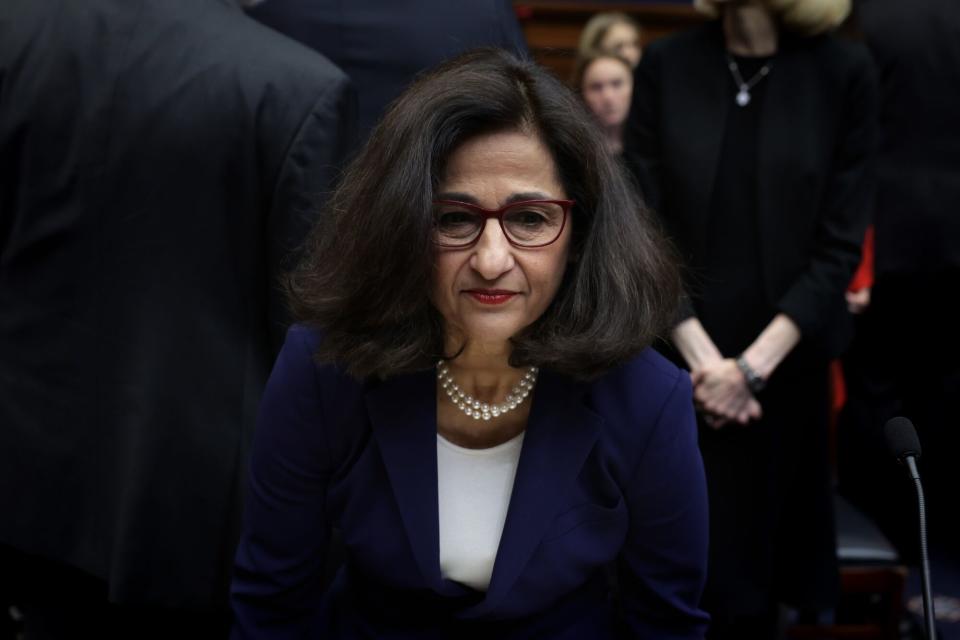Columbia's President Keeps a Shaky Hold on Her Job
(Bloomberg) -- Columbia University President Minouche Shafik’s decision to allow police on campus for two weeks will likely help her avoid the fates of Ivy League leaders who were forced to resign partly over the way they dealt with protests and accusations of antisemitism.
Most Read from Bloomberg
Saudi Arabia Steps Up Arrests Of Those Attacking Israel Online
Everything Apple Plans to Show at May 7 ‘Let Loose’ iPad Event
Trump Auditions VP Picks Before Wealthy Donors in Palm Beach
Shafik, an economist who started the job in July, continues to face a barrage of criticism for failing to get pro-Palestinian protests under control, even as she has twice sent in the police to crack down on demonstrators. Some thought the intervention should have been sooner, while other critics are decrying her tactics and the more than 100 arrests this week as a violation of civil liberties and free speech.
And while she’s so far been able to dodge calls to resign — unlike counterparts at Harvard University and the University of Pennsylvania who were pushed out — her situation feels fraught. She’s in a delicate position of trying to appease critics from all sides — some concerned about excessive force, others urging a stronger response.
Despite the external pressure, university trustees are firmly behind Shafik. The 20 trustees, who have the power to hire and fire the university’s president, come with a range of political backgrounds and perspectives on the role of public protest.
Claire Shipman, co-chair of the trustees and a graduate of Columbia, says Shafik is acting like a leader should.
Born in Alexandria, Egypt, and raised in the US, Shafik has held leadership positions at the International Monetary Fund, the Bank of England and the London School of Economics and Political Science.
“She listens, she adapts, she is flexible,” Shipman said in an interview. “And she is quite wise about what the moment calls for.”
She first called in the police on April 18, just a day after she was grilled by US lawmakers over antisemitism on campus. Now, she’s brought them back and asked them to stay on the Morningside Heights campus until May 17, two days after the scheduled commencement ceremony.
Shafik defended her actions in a statement, saying that she was “patient in tolerating unauthorized demonstrations” for months, but was forced to bring in the police after protesters occupied Hamilton Hall and talks broke down.
“I know I speak for many members of our community in saying that this turn of events has filled me with deep sadness,” Shafik said. “I am sorry we reached this point.”
All 10 House Republican lawmakers from New York have urged her to resign, and Ritchie Torres, a Democrat from New York, joined them.
“The president of Columbia University stood by passively for two weeks, allowing campus life to be held hostage by the encampment movement — which only served to deepen a sense of insecurity among Jewish students on campus,” Torres said. The police response “could have been prevented if the president had shown decisive leadership from the outset.”
Torres said that protesters should have been threatened with expulsion and visa revocation.
The protests on Columbia’s campus over Israel’s bombardment of Gaza, which was in response to a terrorist attack on Oct. 7, escalated in recent weeks to the point where some Jewish students were advised by a campus rabbi to go home and the school moved classes online, drawing condemnation about the lack of protection for Jewish students.
After calling the police the first time backfired, Shafik resorted to a gradual approach, setting up talks with protesters and eventually offering concessions. One of the group’s central demands, though, was that Columbia divest assets that support Israel, a condition rejected by the university. The protesters also wanted amnesty for pro-Palestinian students. After that failed and she threatened suspension, the building takeover occurred. Finally, she introduced a threat of expulsion, before once again bringing in the police.
Unlike her peers at Harvard and Penn who quit after their disastrous testimony in front of a Congressional hearing, Shafik isn’t facing a large-scale revolt from donors. Robert Kraft, owner of the New England Patriots, has said he’s pulling his financial support until the school deals with antisemitism and “virulent hate” on campus, but hasn’t demanded she resign.
Joseph Stiglitz, the Columbia professor who is a Nobel laureate and former World Bank chief economist, said Shafik found herself in a difficult spot as protests intensified.
Calling in the police “was, from her point of view, something of a last resort,” Stiglitz said in an interview conducted for an upcoming episode of Bloomberg’s In the City podcast. “I don’t want to second guess the difficult decision she had to face.”
Some students were grateful for law enforcement on a campus that has no police force of its own, only unarmed public safety officers.
“Having added police presence makes me feel safer walking around with my kippah without covering it up,” said Zachary Singerman, 19. “There needed to be some level of consequence for the people breaking into Hamilton Hall.”
Others said the police made them feel unsafe. Suleyman Ahmed, a senior studying sustainability and math, stood outside the campus gate dressed in his graduation gown and hat with a sign that read “cops off campus.”
“I’m grieving with not having a normal graduation,” said Ahmed, who didn’t participate in the pro-Palestinian protests. “I disagree with how some protested, but I’m struggling to understand why police are here ‘til graduation.”
“In terms of my personal safety, I feel worse all the way around,” he added.
Hitendra Wadhwa, a Columbia Business School professor since 2002, said Shafik’s next challenge is bringing the community together. He began consulting with the board of trustees in August, and is also the parent of a Columbia senior set to graduate this year.
“I’ve seen the board solidly behind her. I’ve seen so much advancement and progress in the last few days,” said Wadhwa, who teaches a class called Personal Leadership & Success. “It is my hope that with an increased stabilization of the physical environment on campus that by the time commencement comes, Minouche will be in a position to be the chief healer.”
While photos showed some professors and instructors locking arms next to the protest encampment earlier in the week, Wadhwa said faculty shouldn’t be seen as having monolithic views.
“While there are some who have taken very strong positions on one side or the other, there are a large number who see the struggle that she faces to bring the community together and who are doing their part in quiet and unsung ways to support that goal,” he said.
--With assistance from Katia Porzecanski, Francine Lacqua, Sommer Saadi and Janet Lorin.
Most Read from Bloomberg Businessweek
AI Is Helping Automate One of the World’s Most Gruesome Jobs
China Launches Rockets From Sea in Bid to Win the Space Race
©2024 Bloomberg L.P.

 Yahoo News
Yahoo News 




